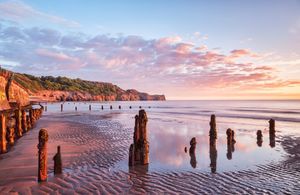Update on investigation into crustacean deaths on North East coast in 2021
Independent panel to assess the evidence and explanations for high crab and lobster mortality.

A large number of crabs and lobsters died along the North East coast last year.
An independent panel of external experts is to be set up to assess the evidence surrounding the deaths of large numbers of crustaceans, such as crabs and lobsters, on the North East coast between September and December 2021.
In a letter to the Environment Food and Rural Affairs Committee, Fisheries Minister Mark Spencer confirmed Defra’s Chief Scientific Advisor Gideon Henderson, who has not previously been involved in considering this issue, would liaise with the Government Chief Scientific Adviser Sir Patrick Vallance to establish the independent group.
The group will be made up of experts from outside government and will work with Professor Gideon Henderson and Sir Patrick Vallance to assess the evidence and consider all explanations for the sealife mortality, including the possible roles of algal blooms, dredging and pyridine. They will consider the findings of the Defra-led investigation published in May 2022 and research from university researchers, using all available data and informed by the wider scientific literature and by expert opinion.
Fisheries Minister Mark Spencer said:
I recognise fishing communities in the North East want as thorough an assessment as possible into the crab and lobster deaths last year.
Defra’s investigation concluded that the most likely cause was an algal bloom, but we have always recognised this is a complex area of science and have remained open to further research.
That’s why it is right that all the evidence is now assessed by independent experts and I look forward to receiving their advice.
Defra Chief Scientific Adviser, Professor Gideon Henderson, said:
The death of a large number of crustaceans last year in North East England was unusual. The causes have been assessed, informed with a wide range of measurements, by Government agencies and by university researchers, with more than one explanation put forward to explain the deaths.
The increased sea-life mortality has important consequences for local communities and it is important we understand its cause. I have discussed the issue with the Government Chief Scientific Adviser and look forward to working with him to convene a panel of relevant experts from outside government to re-examine all available data and consider this matter carefully.
The panel will be asked to conduct and complete their work in a timely fashion and to provide advice on what further evidence or actions may be advised. Their findings will be published and further details on the panel of experts and their terms of reference will also be made available in due course.